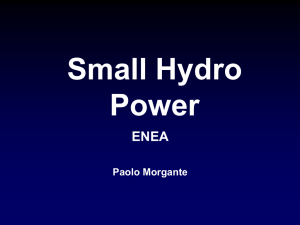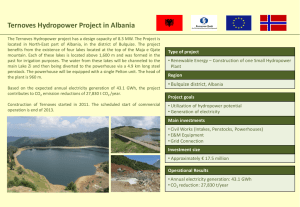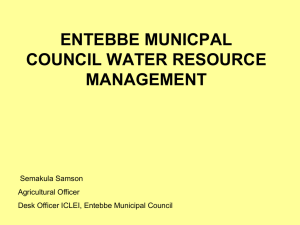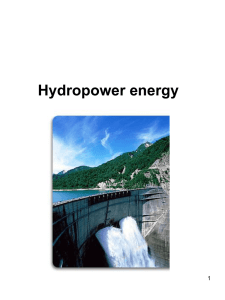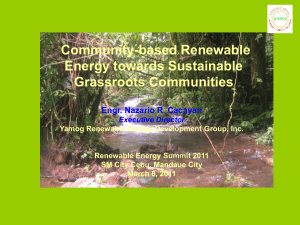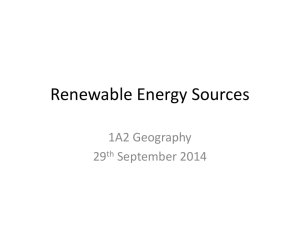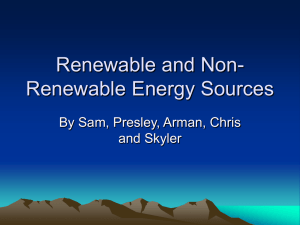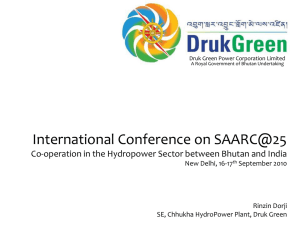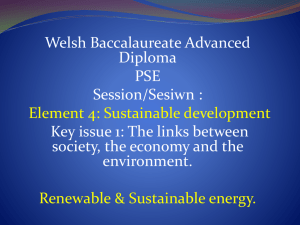Small Hydropower Large Potential
advertisement
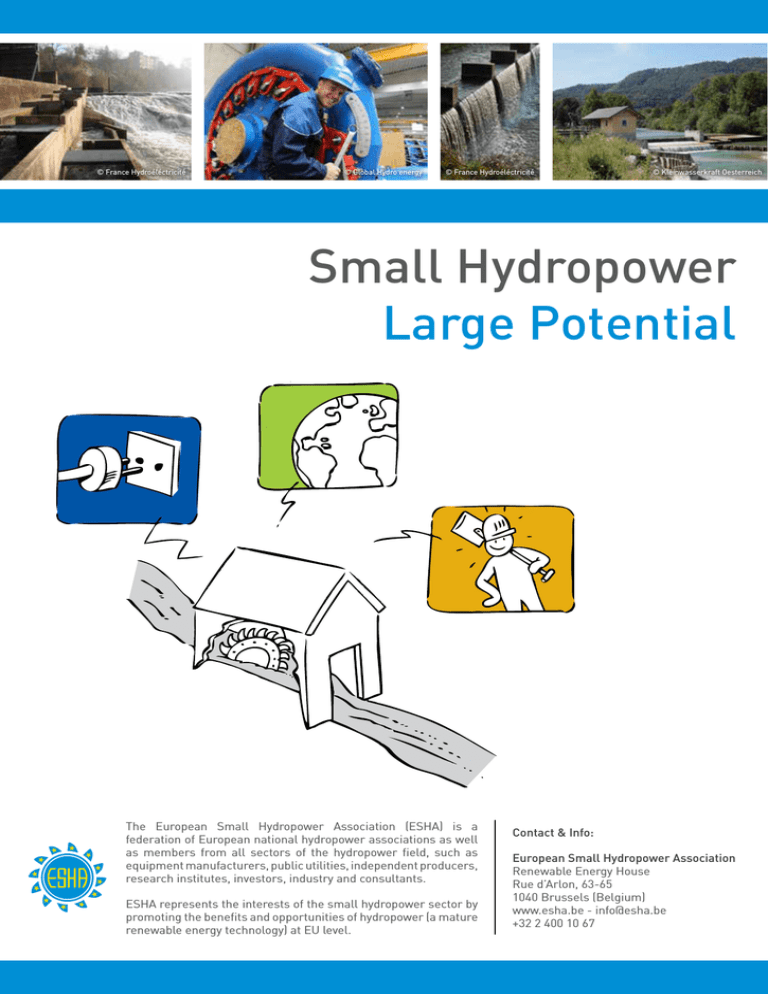
© France Hydroéléctricité © Global Hydro energy © France Hydroéléctricité © Kleinwasserkraft Oesterreich Small Hydropower Large Potential The European Small Hydropower Association (ESHA) is a federation of European national hydropower associations as well as members from all sectors of the hydropower field, such as equipment manufacturers, public utilities, independent producers, research institutes, investors, industry and consultants. ESHA represents the interests of the small hydropower sector by promoting the benefits and opportunities of hydropower (a mature renewable energy technology) at EU level. Contact & Info: European Small Hydropower Association Renewable Energy House Rue d’Arlon, 63-65 1040 Brussels (Belgium) www.esha.be - info@esha.be +32 2 400 10 67 Did you know? In general, small hydropower (SHP) stands for a plant with an installed capacity of up to 10 MW. SHP currently supplies enough electricity for 13 million households. SHP plays a key role in greenhouse gas emissions reduction through green energy production and support to other technologies (e.g. wind, solar). SHP is a very efficient decentralised electricity production technology. SHP is important for European economies and for regional development. SHP has a large potential for development and refurbishment of plants. Current challenges SHP and its potential for Europe is often overlooked and kept away from the European and national policy agendas. SHP can be negatively impacted by environmental legislation in Europe, so that it becomes more difficult to produce renewable energy from water. It is however a technology which can be used for water management purposes. SHP faces many administrative barriers at national level, making it difficult for the sector to be granted or to keep exploitation licenses and to have an efficient access to the electricity grid. The adaptation of certain support schemes can have an impact on the viability of the sector, in particular when not being cost-based. Recommendations More consensus and cooperation is needed in Europe between the energy and environmental policies and actors. European and national policy makers should consider SHP as an equally important component of the renewable energy mix. EU and national environmental policies must ensure the economic viability of the SHP sector. Fair support mechanisms should take into account the multipurpose features of hydropower and the growing costs arising from environmental obligations. Research funding should be increased to better exploit the energy potential of SHP and facilitate the operation of plants. Small Hydropower Large Potential © Ekowatt © MHyLab © APPA Spain © Kleinwasserkraft Oesterreich Small Hydropower Sustainable Energy The European Small Hydropower Association (ESHA) is a federation of European national hydropower associations as well as members from all sectors of the hydropower field, such as equipment manufacturers, public utilities, independent producers, research institutes, investors, industry and consultants. ESHA represents the interests of the small hydropower sector by promoting the benefits and opportunities of hydropower (a mature renewable energy technology) at EU level. Contact & Info: European Small Hydropower Association Renewable Energy House Rue d’Arlon, 63-65 1040 Brussels (Belgium) www.esha.be - info@esha.be +32 2 400 10 67 Did you know? Small hydropower (SHP) plays a key role in the reduction of greenhouse gas emissions, demonstrating the best performances when it comes to emissions measured on a lifecycle basis. SHP favours the deployment of other green technologies (wind and solar). SHP can support water management policies. SHP helps adapting to climate change through flood and drought control applications. Recommendations More consistency and cooperation is needed in Europe between the energy and environmental policies and respective stakeholders. Environmental policies should be based on sound scientific assessment, clear definitions and a cost-benefit analysis. Current challenges European environmental legislation (Natura 2000, Directives on Environmental Assessment, Water Framework Directive, etc.) and national implementing laws can hinder the development, the operation and the refurbishment of SHP plants through some overshooting measures lacking scientific evidence, consistent interpretations (e.g. river continuity, heavily modified water bodies) and clear definitions. A harmonised framework for interpretation of European policies is needed with sitespecific evaluation taking into account all dimensions of sustainability. SHP should be considered as a technology that supports water management policies. A European best-practice guide for meeting water policy objectives through SHP should be developed for this purpose. European and national environmental policies often overlook the contribution of SHP to the fight against climate change through renewable energy production and support. There is a lack of consistency with the European Renewable Energy Directive. Small Hydropower Sustainable Energy © France Hydroéléctricité © France Hydroéléctricité © France Hydroéléctricité © France Hydroéléctricité Small Hydropower High Quality Energy The European Small Hydropower Association (ESHA) is a federation of European national hydropower associations as well as members from all sectors of the hydropower field, such as equipment manufacturers, public utilities, independent producers, research institutes, investors, industry and consultants. ESHA represents the interests of the small hydropower sector by promoting the benefits and opportunities of hydropower (a mature renewable energy technology) at EU level. Contact & Info: European Small Hydropower Association Renewable Energy House Rue d’Arlon, 63-65 1040 Brussels (Belgium) www.esha.be - info@esha.be +32 2 400 10 67 Did you know? In general, small hydropower (SHP) stands for a plant with an installed capacity of up to 10 MW. With 13,000 MW of total installed capacity in EU27, SHP currently supplies enough electricity for 13 million households. SHP contributes to around 8% of electricity production within the renewable energy mix. SHP is one of the most efficient, reliable and cost-effective methods to generate electricity. SHP provides steady, secure and local electricity. SHP - e.g. through small pumped-hydro plants can support the penetration of variable RES technologies (e.g. wind, solar), i.e. indirectly favours their deployment in decentralised areas. SHP has a large development potential. If the current policy framework is changed, new SHP could annually produce additional 50 TWh in the EU-27. There is also a considerable potential for refurbishment of older and abandoned SHP sites. Current challenges European and national environmental policies often overlook the contribution of SHP to renewable energy production. There is a lack of consistency between environmental policies and the European Renewable Energy Directive. Recommendations European and national policy makers must consider SHP as an equally important component of the renewable energy mix. More consensus and cooperation is needed in Europe between the energy and environmental policies and actors. Decentralisation of energy production should be supported by granting an effective primary access of SHP to the grid, allowing for net-billing (payment for actual electricity sent to the grid) or/and authorising SHP producers to directly sell electricity to third parties. More research funds should be allocated to SHP development, in particular concerning low head technologies, (pumped hydro) storage and grid access. SHP faces many administrative barriers to decentralised renewable energy production. The licensing procedure for the sector is currently an extremely time consuming, highly bureaucratic procedure and with too many uncertainties. Sometimes national measures challenge effective access to the grid. SHP potential to produce flexible energy solutions is overlooked (storage, pumped-hydro). Small Hydropower High Quality Energy © MJ2 Technologies © Global Hydro energy © Global Hydro energy © TURAB Small Hydropower Engine for Growth The European Small Hydropower Association (ESHA) is a federation of European national hydropower associations as well as members from all sectors of the hydropower field, such as equipment manufacturers, public utilities, independent producers, research institutes, investors, industry and consultants. ESHA represents the interests of the small hydropower sector by promoting the benefits and opportunities of hydropower (a mature renewable energy technology) at EU level. Contact & Info: European Small Hydropower Association Renewable Energy House Rue d’Arlon, 63-65 1040 Brussels (Belgium) www.esha.be - info@esha.be +32 2 400 10 67 Did you know? The Small Hydropower (SHP) industry has an important economic value for Europe with at least 29,000 direct employees and 4,200 companies working in the sector1. SHP can support regional development: agriculture (additional revenues for farmers, irrigation, flood control), tourism (history of ancient mills, electricity for touristic attractions in remote areas) and other benefits to local communities (water supply, monitoring of water quality, additional income opportunity for inhabitants of remote areas and for authorities through taxes). The refurbishment of old SHP plants could generate high incomes for European companies. 1. These figures do not include data from Germany and Austria. Current challenges European environmental legislation and national implementing laws hinder the development, the operation and the refurbishment of SHP plants through some overshooting measures which have a high impact on the economic viability of the sector. SHP faces many administrative barriers. The licensing procedure for the sector is currently an extremely time consuming, highly bureaucratic procedure and with too many uncertainties. The adaptation of certain support schemes can have an impact on the viability of the sector, in particular when not being cost-based. Some evolutions in water rights can also negatively affect the sector. Recommendations Environmental policies should be based on a cost-benefit analysis to ensure the economic viability of the SHP sector. Licensing procedures and issuing permits should rely on simple, fair, solid & transparent procedures (‘One-stop shops’). Fair support mechanisms should take into account the multipurpose features of hydropower and the growing costs arising from operation and environmental obligations. Effective primary access of SHP to the grid, net-billing (payment for actual electricity sent to the grid) or/and authorised direct selling of electricity to third parties in the Member States where it is not possible today are measures that would increase the competitiveness of SHP, while promoting decentralised energy production. Member States should develop strategies to fully integrate SHP plants in regional development policies (e.g. touristic activities). SHP developers and investors lack a fair and stable policy framework. Research lacks adequate funding in order to help the sector to reach its full potential. Small Hydropower Engine for Growth
